13 August | 14 August | 15 August| 16 August
Monsignor Fernando Ocáriz began his last day in Paraguay by preaching in the oratory of La Cumbrera to some faithful of the Prelature. He spoke to them about fraternity, about knowing how to forgive, and about serving. He recalled how Saint Josemaria would say that “charity, more than in giving, consists in understanding,” and he encouraged them to be attentive to the needs of others.
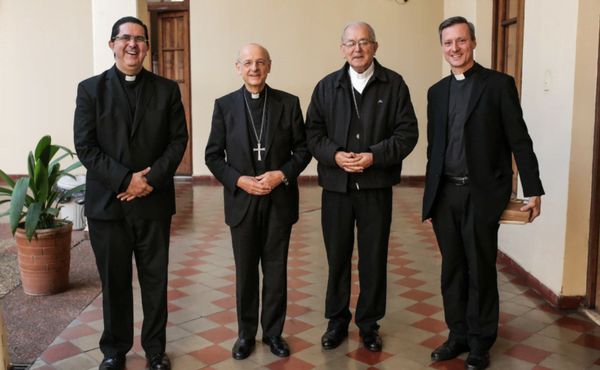
After breakfast, the Prelate made his way to the apostolic nunciature to visit Archbishop Eliseo Ariotti, papal nuncio for Paraguay. The meeting was brief and cordial. It was followed by a visit to the Archbishop of Asunción, Edmundo Valenzuela, at the archbishop's house close to the Cathedral. Among other things, they spoke about the recent beatification of "Chiquitunga," the first Paraguayan woman named blessed, who enjoys a widespread popular devotion.
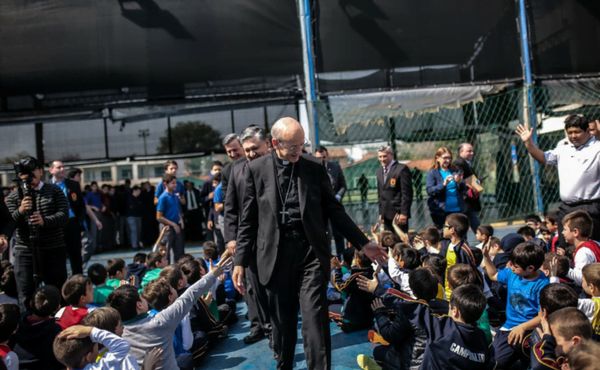
Afterward, the Prelate of Opus Dei visited Campoalto School, an educational project inspired by Saint Josemaría's teaching that has about 600 students. As he entered the school, a bustling passageway was filled with children who were waiting for him, and who greeted him as he made his way to the oratory. In Paraguay, today is the official "day of the child," and Monsignor Ocáriz smiled as he slapped the children's hands and met an enthusiastic response as he walked by quickly.
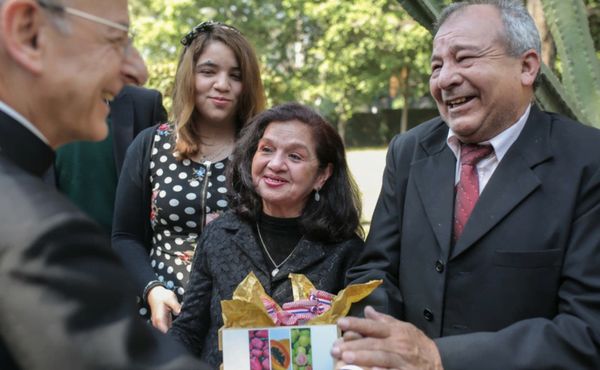
Also at Campoalto, Ricardo gave the Prelate an exquisitely made Paraguayan crucifix, while Carlos and Rafael, directors at the school, told him about its activities and efforts.
After greeting a group of mothers, the Prelate went to the central courtyard where hundreds of students gathered around him. Monsignor Ocáriz took the microphone and thanked them for having received him at the school and he encouraged them to be good students, good friends to one another, and to be always better friends of Jesus Christ.
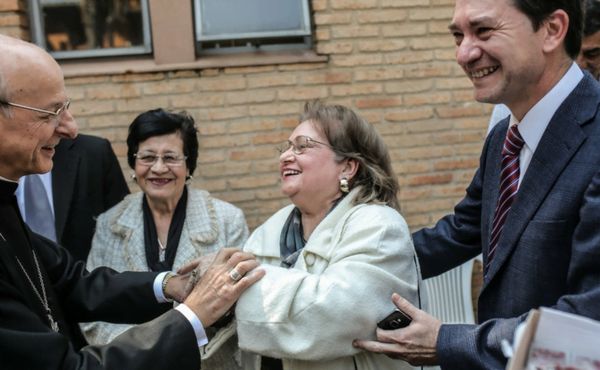
At noon, he received families at the Villa Morra Cultural Center. "We are so happy with your visit,” they told him. “We will take all this to our friends too – everything we've learned from you today." Gloria also told him, "Come back soon, Father!" To which the Prelate replied, "Let’s hope it’s not 21 years later, like this time!"
Finally, he made his way to the airport where some young people had come to say good bye. Among them was a young couple with three small children, who took advantage of the opportunity to greet the Prelate as he was leaving.
The Prelate celebrated the Mass of the Assumption of Our Lady in the oratory of La Cumbrera, the conference center where he is staying. He was quite moved by the experience, finding himself in the city of the Assumption (Asuncion, Paraguay), and also because it was the 47th anniversary of his ordination to the priesthood.
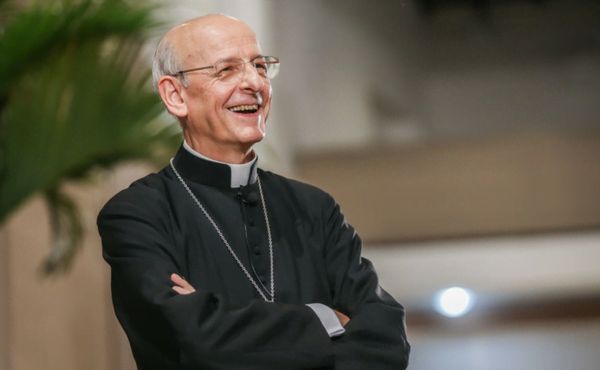
Around mid-morning, there was a get-together with women faithful of the Prelature at the Mariscal López Convention Center. Teresa played a song on the harp that she had also performed for Saint Josemaría in 1974 in Buenos Aires.
In response to the questions people raised, Monsignor Ocáriz spoke about various topics, including love and fidelity in marriage and order and diligence. Monica, a mother of a family, told him that whenever they travel as a family, they entrust themselves to the guardian angels, and that a month ago they had a serious traffic accident, but miraculously no one was hurt. She then asked how the custom of giving a blessing before making a trip arose in the Work. Another person present, Mayra, asked for advice on how to avoid forgetting about God's presence in a chaotic world. The Prelate stressed the importance of order to be able to master complex situations, and thus not to let circumstances dominate us.
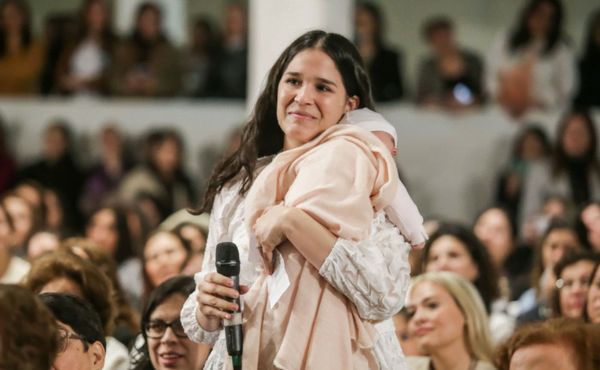
After lunch, Monsignor Ocáriz spent some extra time with those he had dined with at the Colonial House. As he entered the living room, those present sang him a song entitled Felicidades ("Congratulations"), a polka tune typically sung on special anniversaries. They also performed a song called Mombyry Guive, which means "From afar" in Guaraní, the native language.
María Angélica, one of the first women who came to start the Work in Paraguay, gave him a gift on behalf of everyone: a chalice made by a Paraguayan goldsmith.
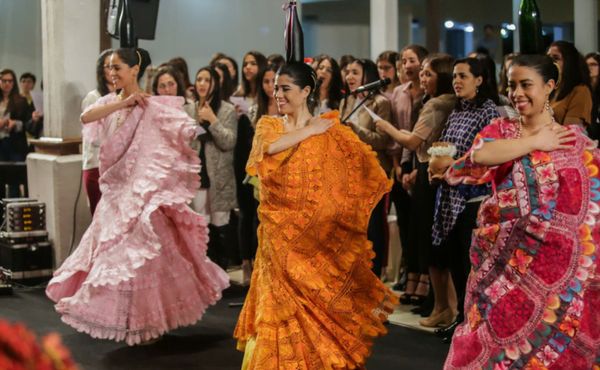
Later, there was another gathering, this time with young people. Angie, Gianni and Guada performed a famous Paraguayan dance, dressed in the traditional dresses. Part of the dance involves balancing bottles on one's head while dancing.
During the get-together, Luisa told the Prelate that she met Opus Dei through a colleague, and that what most impressed her was the possibility of sanctifying her work.
Monsignor Ocáriz also paid a visit to Las Almenas School to bless the new oratory. He greeted Sandra, the school's director, and the other staff as well as the founding families. The 3rd grade students, who will make their First Communion this year, sang him the school hymn as he was arriving. The Prelate then visited the oratory and prayed a Hail Mary with everyone, and later remarked on how beautiful the altarpiece was. He also noticed a commemorative plaque which said that this oratory, dedicated to the Holy Family, is the work of the families and alumni of the school. As he was leaving, he lit a candle while three graduates of the school, two of whom are blind, sang Schubert's Ave Maria.
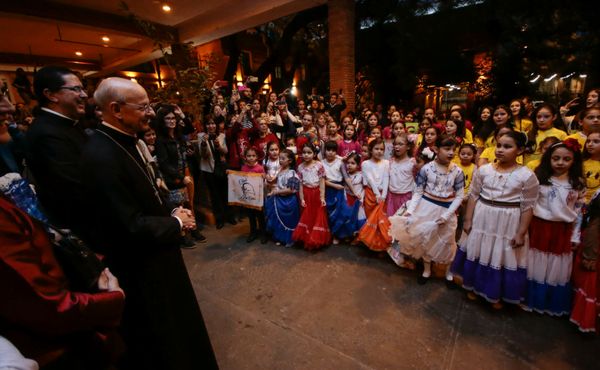
In another get-together back in the conference center, Juan José recalled how Pope Francis had praised the women of Paraguay, and joked that the comment didn't leave Paraguayan men looking too good. Having brought up the topic, he asked the Prelate how they could combat "machismo" and be more involved in what goes on at home. Monsignor Ocáriz invited him to love his wife more each day and to spend time in prayer thinking of ways to show his affection for her.
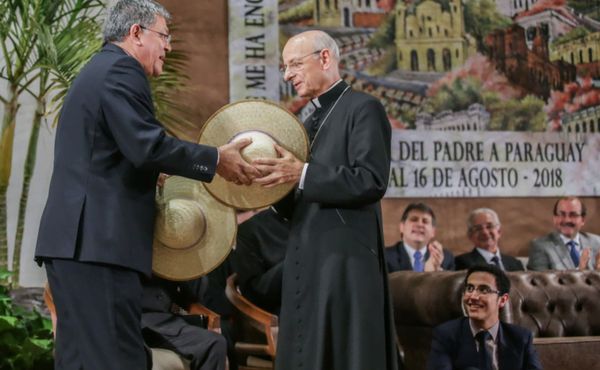
Sergio then made the following daring suggestion to the Prelate: that whenever he prays the fourth Glorious mystery of the Rosary (the Assumption of Our Lady into Heaven) that he remember to pray specifically for those in Asuncion. He also asked for advice on ways to strengthen conjugal love. Monsignor Ocáriz advised him to learn from the experience of his failures, and to ask God for help.
Today the Prelate visited the facilities of the new Buenafuente School site, which is attached to La Cumbrera, where he is staying. Although the day was cloudy and drizzling, Monsignor Ocáriz planted a tree with the help of Koki, who works at Buenafuente.
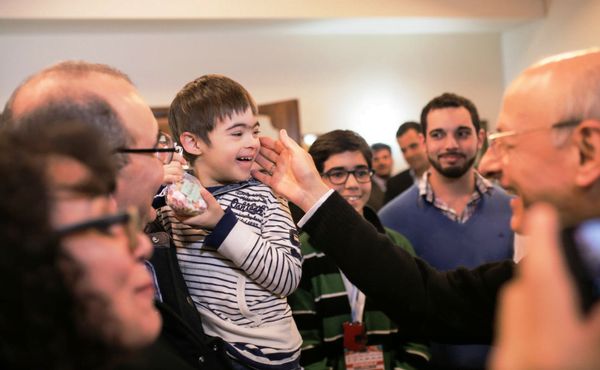
Students from the school support group came early with their parents to greet the Prelate, and sang a traditional song for him. He thanked them for their presence and gave them his blessing. He also distributed candies to the children and lit a candle before an image of Our Lady.
At noon, he greeted several families from Encarnacion, Ciudad del Este and Asuncion. The Feschenko family offered him rosaries they had made themselves, so that the Prelate could give them away as he liked during his trip.
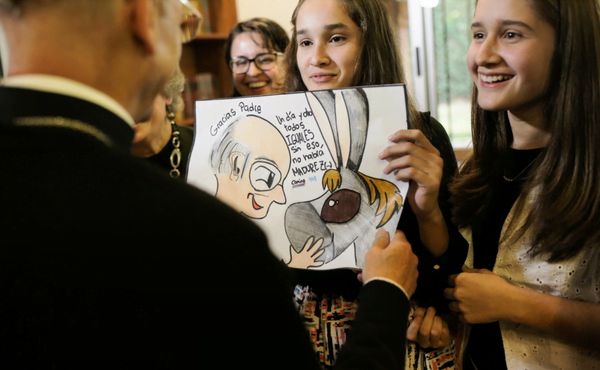
The Portillo family surprised the Prelate with a song that 11-year old Nacho composed for the occasion, including the following lines: "We are the Portillos and here we are with you. We pray always for you, since you bear a great responsibility. Thanks to you, people come to believe; thanks to you, Christianity is increasing."
After lunch, the Prelate made his way to the Colonial House to have another get-together with women of the Work, who had come from all over Paraguay. There was also a small group from Posadas (Argentina) and from Montevideo (Uruguay). One of those present gave him a "piggy bank" with money collected by her niece to distribute to needy people during his trip.
Later, back in the living room at La Cumbrera, he greeted several families and then had a get-together with students. This encounter began with an invitation that they read the Gospel, imagining that each is a character in the scene. He explained that this is a "very good way to be in tune with Jesus Christ."
During the get-together, David asked the Prelate about the best way to prepare for the upcoming synod on youth and vocation. First, pray. Then, trying to discern one's personal vocation, knowing that God has a plan for each one, holiness, and that "what God asks of us is a gift that He gives us."
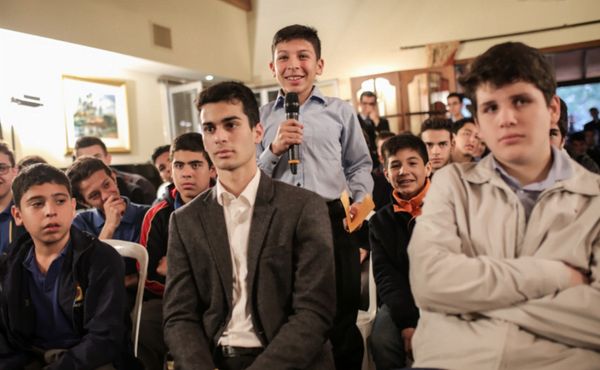
Diego then jokingly complained about the 21 years that had gone by since the Prelate's last visit to Paraguay, but Monsignor Ocáriz pointed out that 21 years ago Diego was not even born. Diego also expressed his desire to take good advantage of the formation he was receiving, and to not get used to receiving talks on Christian life. Monsignor Ocáriz suggested he try to "recover the eagerness of the first time," since "when a person's faith is alive the desire to know Christ better is strong."
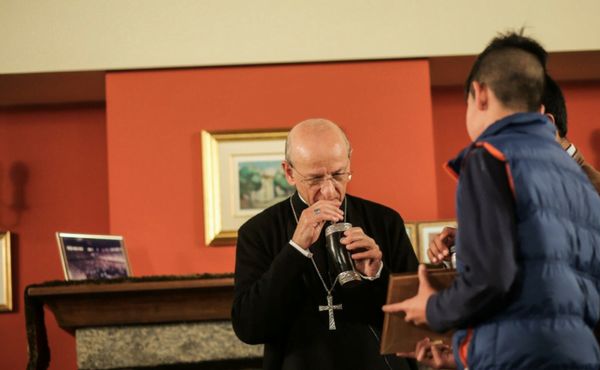
During his visit to the Laguna Grande school, the students gave the Prelate a t-shirt and offered him tereré, a traditional Paraguayan drink. When Martin asked about the good use of cell phones, the Prelate invited him to be honest with himself: what do I look for when using my phone? Ezequiel told him that he does not go to a center of Opus Dei, but that the Work comes to his house instead, because in Encarnacion the means of formation take place at his house. The Prelate told them all that "the apostolate of Opus Dei is in your hands: yours and those of your friends."
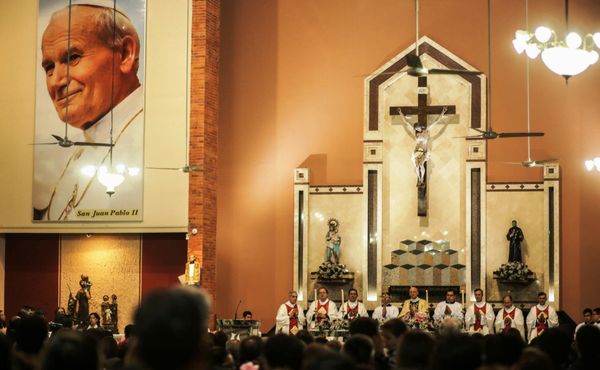
In the evening, Saint Christopher Parish was overflowing with people, for the double joy of celebrating the Feast of the Assumption, patroness of the city, and taking part in the Mass presided over by Monsignor Ocáriz.
In the intentions for the Mass, Bishop Rogelio Livieres was remembered on the third anniversary of his death. He was the first priest of the Work from Paraguay, and Bishop Emeritus of Ciudad del Este.
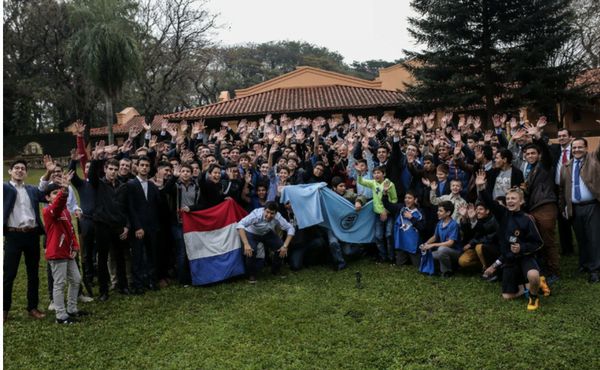
In the homily, the Prelate highlighted the relationship between the feast of the Assumption and the history of the city. He also said that "through the Assumption, Our Lady is now closer to us, since she is now so closely united to God that she is able to listen to us and be present with each and every one of us." He stressed that "she listens to us as a mother," and that "Heaven is very close to us, through her maternal mediation. She is always ready to listen to us. This should encourage us to go to Our Lady more often, to have more confidence in her intercession, specifically in ways that the Church's tradition offers us: the rosary and other devotions. But always with filial affection, because we are truly children of the one who is God's Mother."
At the end, the Prelate spoke about the importance of service: "In the Gospel that we just heard, the first thing Our Lady does is to think about her cousin, setting out quickly, in a hurry, and then she stays for several months helping her."
"This present us," he continued, "with the path for giving ourselves to others, for serving them. Let us go to Our Lady frequently, and ask her to teach us to serve, to understand others, to make excuses, to be concerned about others. In this way, Mary will lead us to Jesus. "
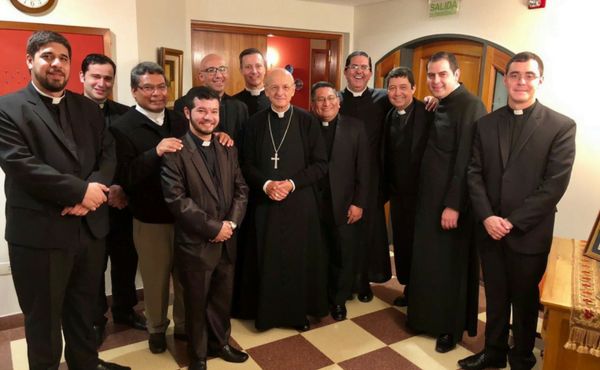
In the evening, he dined with priests who are members of the Priestly Society of the Holy Cross. Father Bernardo told him about his teaching efforts and his apostolic work in a poor neighborhood of Ciudad del Este. And he pointed out that both of them were on the eve of the anniversary of their ordinations. He was celebrating five years as a priest and the Prelate forty-seven.
13 August
On an unusually cool day, the Prelate arrived in Asunción, where he admired the abundance of "lapacho" trees in full bloom, typical of the city's landscape.
Monsignor Ocáriz greeted several families who came to welcome him at the airport, with their lively young children. The Tapia family was ready with a welcoming poster, while Ricardo greeted the Prelate in both Spanish and Guaraní, the official language of the country. The Gonzalez family, together with the Portillos, the Prietos, and the Colmans, offered flowers and small gifts to the Prelate, while their children played with colored balloons. The atmosphere, full of affection, was one of peace and joy.
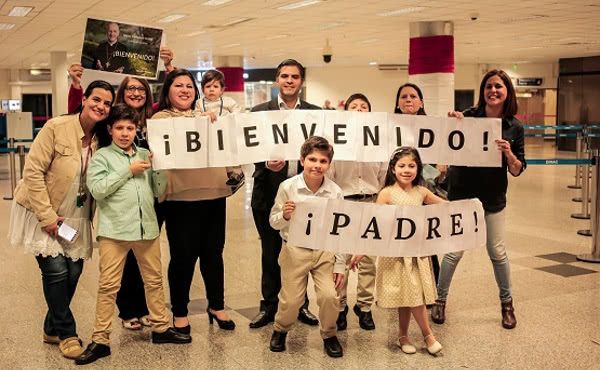 A short while later, Monsignor Ocáriz arrived at La Cumbrera, the retreat house where he will stay for the next few days. He greeted a group of women who were waiting for him there, and they received him with loud applause, using the typical local greeting, "Mbaéichapa Padre," which means, "How are you, Father?" In addition, they sang a song entitled "We welcome you."
A short while later, Monsignor Ocáriz arrived at La Cumbrera, the retreat house where he will stay for the next few days. He greeted a group of women who were waiting for him there, and they received him with loud applause, using the typical local greeting, "Mbaéichapa Padre," which means, "How are you, Father?" In addition, they sang a song entitled "We welcome you."